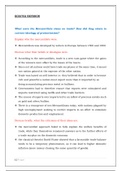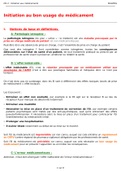What were the Mercantilists views on trade? How did they relate to
current ideology of protectionism?
Explain who the mercantilists were.
❖ Mercantilism was developed by writers in Europe between 1500 and 1800.
Discuss what their beliefs or ideologies were.
❖ According to the mercantilists, trade is a zero sum game where the gains
of the winners were offset by the losses of the losers.
❖ Since not all nations could have trade surpluses at the same time, it meant
one nation gained at the expense of the other nation.
❖ Trade was based on self-interest i.e. they believed that in order to become
rich and powerful a nation must export more than it imported by so
doing accumulating precious metal or bullions.
❖ Governments had to therefore ensure that exports were stimulated and
imports restricted using tariffs and other trade barriers.
❖ The excess of exports over imports led to an inflow of precious metals such
as gold and silver/bullion.
❖ There is a resurgence of neo Mercantilisms today, with nations plagued by
high unemployment seeking to restrict imports in an effort to stimulate
domestic production and employment.
Discuss briefly, what the criticisms of their ideas are.
❖ the mercantilist approach failed to fully explain the welfare benefits of
trade, while they themselves remained unaware as to the further effects of
a trade surplus on the domestic economy
❖ the classical theorist David Hume showed that a favourable trade balance
tends to be a temporary phenomenon, as it can lead to higher domestic
inflation (more money chasing the same quantity of goods).
1|Page
,❖ The resultant higher prices for domestically produced goods tend to
adversely affect the international competitiveness of the economy's
exports, thereby encouraging more imports into the country.
❖ Adam Smith, also refuted the mercantilists belief that "the size of the
world's economic pie is constant", and therefore a nation may only gain
from trade at the expense of its trading partners. Smith argued that world
output was not a fixed amount, but rather that trade between countries
afforded the possibility for the latter to specialise in the production of
particular goods, improving productivity through the division of labour,
and ultimately leading to an increase in world output.
❖ Furthermore, both Smith and another classical theorist, David Ricardo,
argued that countries who are partners in trade can simultaneously
achieve higher output levels of production and consumption as a result of
free trade.
Critically evaluate Adam Smith’s theory of absolute advantage,outlining
the assumptions necessary for the theory to hold in its purest form. What
are the criticisms of this theory?
This question has three parts to it.
What does absolute advantage mean?
Adam Smith developed the theory of absolute advantage. Smith pointed that
mutually beneficial trade between two nations is possible only if each had an
absolute advantage in the production of 1 of the commodities. A nation has
an absolute advantage in the production of commodity X if it can produce it
more efficiently than its trading partner. By trading according to absolute
advantage, complete specialization occurs
There is also increased output as a result of specialization. Mutually beneficial
trade will not occur if one nation has an absolute advantage in the production
2|Page
,of both commodities.For trade to occur the domestic terms of trade must fall
within the international terms of trade.
The theory is founded upon the following ASSUMPTIONS
❖ Producers and consumers display rational behaviour.
❖ It’s a 2 commodity, 2 nation model.
❖ There is full employment
❖ Labour is the only factor of production
❖ Each country has a fixed endowment of resources
❖ Perfect competition exists
❖ Factors of production are mobile between the two commodities and within
the country, but not between countries
❖ There are no barriers to trade
❖ Production shoes constant returns to scale
❖ There are no transport costs
❖ The level of technology is fixed for both countries, but may differ between
them.
Criticisms
❖ The theory has been criticised for the fact that it assumes labour is the
only factor of production. This is not so as there are other factors of
production such as capital, land.
❖ The assumption of perfect competition is unrealistic.
❖ Market structures are characterised by imperfections.
❖ The labour theory of value is oversimplified.
❖ Theory assumes that trade leads to complete specialisation, however
specialisation is always incomplete
❖ Adam smith’s theory can be criticised for not being able to explain trade of
one country has an absolute advantage in the production of both
commodities.
Question 2
3|Page
, Critically discuss the Heckscher-Ohlin theory of international trade.
The Heckscher-Ohlin theory is also known as the factor proportions theory.
It is called the Heckscher-Ohlin theory because it was developed by two
Swedish economists, namely Eli Heckscher and Bertil Ohlin, in 1933.
Assumptions of the theory.
❖ 2 × 2 × 2 Model
• Two countries;
• Two homogenous commodities;
• Two homogenous factor of production (FOPs):
➢ Capital and labour;
➢ Initial levels fixed;
➢ Levels of factors available are different for each country.
❖ Technology is the same in both countries;
❖ Constant returns to scale in production;
❖ Each commodity has a different factor intensity (i.e. one is labour
intensive, and the other is capital-intensive);
❖ Tastes/preferences are the same in both countries (i.e. demand conditions
are the same);
❖ There is perfect competition in both countries;
❖ There is domestic factor mobility, but not international factor mobility (i.e.
factors cannot move between countries);
❖ No transport costs;
❖ There are no restrictions on:
• Trade;
• Determination of market price and output.
4|Page




